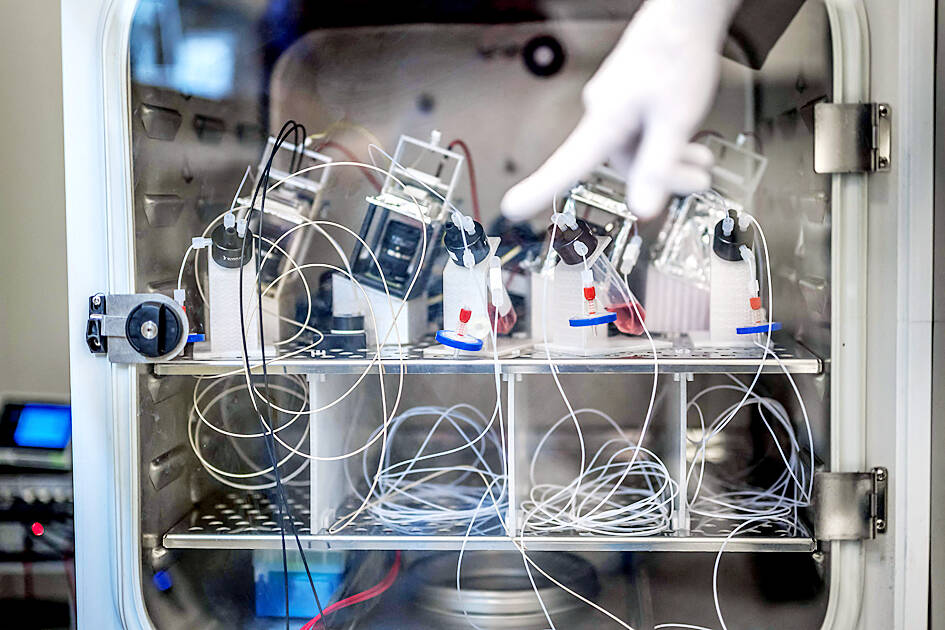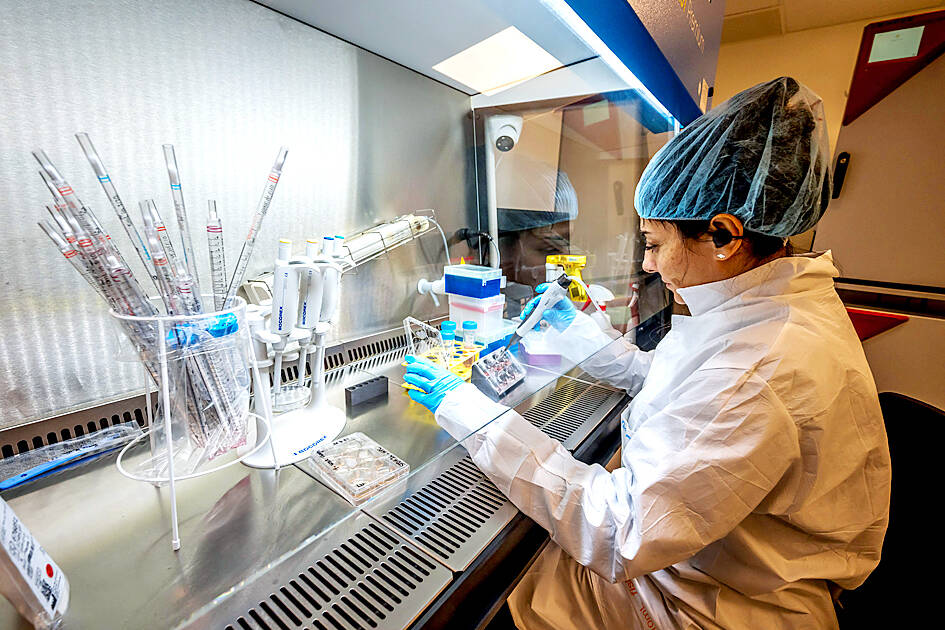Inside a lab in Vevey, Switzerland, a scientist gives tiny clumps of human brain cells the nutrient-rich fluid they need to stay alive.
It is vital these “mini brains” remain healthy, because they are serving as rudimentary computer processors — and once they die, they cannot be rebooted.
This new field of research, called biocomputing or “wetware,” aims to harness the evolutionarily honed yet still mysterious computing power of the human brain.

Photo: AFP
During a tour of Swiss start-up FinalSpark’s lab, cofounder Fred Jordan said he believes that processors using brain cells will one day replace the chips powering the artificial intelligence (AI) boom.
The supercomputers behind AI tools such as ChatGPT use silicon semiconductors to simulate the neurons and networks of the human brain.
“Instead of trying to mimic, let’s use the real thing,” Jordan said.

Photo: AFP
Among other potential advantages, biocomputing could help address the skyrocketing energy demands of AI, which have already threatened climate emissions targets and led some tech giants to resort to nuclear power.
“Biological neurons are one million times more energy efficient than artificial neurons,” Jordan said. They can also be endlessly reproduced in the lab.
For now, wetware’s computing power is a very long way from competing with the hardware that runs the world.
Another question lingers: Could these tiny brains become conscious?
To make its “bioprocessors,” FinalSpark first purchases stem cells. These cells, which were originally human skin cells from anonymous human donors, could become any cell in the body. FinalSpark’s scientists then turn them into neurons, which are collected into millimeter-wide clumps called brain organoids.
Electrodes are attached to the organoids, which allow the scientists to “spy on their internal discussion,” he said.
Scientists could also stimulate the organoids with a small electric current. Whether they respond with a spike in activity or not is roughly the equivalent of the ones or zeros in traditional computing.
Ten universities around the world are conducting experiments using FinalSpark’s organoids.
University of Bristol researcher Benjamin Ward-Cherrier used one of the organoids as the brain of a robot that managed to distinguish between different braille letters.
There are many challenges, including encoding the data in a way the organoid might understand — then trying to interpret what the brain cells “spit out,” he said.
“Working with robots is very easy by comparison,” Ward-Cherrier said. “There’s also the fact that they are living cells — and that means that they do die.”
Ward-Cherrier was halfway through an experiment when the organoid died and his team had to start over.
FinalSpark said the organoids live for up to six months.
At Johns Hopkins University, researcher Lena Smirnova is using similar organoids to study brain conditions such as autism and Alzheimer’s disease in the hopes of finding new treatments.
Biocomputing is more “pie in the sky,” unlike the “low-hanging fruit” use of the technology for biomedical research — but that could change dramatically over the next 20 years, she said.
Some scientists dismissed the idea that the tiny balls of cells in petri dishes were at risk of developing anything resembling consciousness.
Jordan said that “this is at the edge of philosophy,” so FinalSpark collaborates with ethicists.
The organoids — which lack pain receptors — have about 10,000 neurons, compared with a human brain’s 100 billion, he added.
However much about our brains, including how they create consciousness, remains a mystery.
That is why Ward-Cherrier said he hoped that beyond computer processing, biocomputing would ultimately reveal more about how our brains work.

Tens of thousands of Filipino Catholics yesterday twirled white cloths and chanted “Viva, viva,” as a centuries-old statue of Jesus Christ was paraded through the streets of Manila in the nation’s biggest annual religious event. The day-long procession began before dawn, with barefoot volunteers pulling the heavy carriage through narrow streets where the devout waited in hopes of touching the icon, believed to hold miraculous powers. Thousands of police were deployed to manage crowds that officials believe could number in the millions by the time the statue reaches its home in central Manila’s Quiapo church around midnight. More than 800 people had sought

DENIAL: Pyongyang said a South Korean drone filmed unspecified areas in a North Korean border town, but Seoul said it did not operate drones on the dates it cited North Korea’s military accused South Korea of flying drones across the border between the nations this week, yesterday warning that the South would face consequences for its “unpardonable hysteria.” Seoul quickly denied the accusation, but the development is likely to further dim prospects for its efforts to restore ties with Pyongyang. North Korean forces used special electronic warfare assets on Sunday to bring down a South Korean drone flying over North Korea’s border town. The drone was equipped with two cameras that filmed unspecified areas, the General Staff of the North Korean People’s Army said in a statement. South Korea infiltrated another drone

COMMUNIST ALIGNMENT: To Lam wants to combine party chief and state presidency roles, with the decision resting on the election of 200 new party delegates next week Communist Party of Vietnam General Secretary To Lam is seeking to combine his party role with the state presidency, officials said, in a move that would align Vietnam’s political structure more closely to China’s, where President Xi Jinping (習近平) heads the party and state. Next week about 1,600 delegates are to gather in Hanoi to commence a week-long communist party congress, held every five years to select new leaders and set policy goals for the single-party state. Lam, 68, bade for both top positions at a party meeting last month, seeking initial party approval ahead of the congress, three people briefed by

Cambodia’s government on Wednesday said that it had arrested and extradited to China a tycoon who has been accused of running a huge online scam operation. The Cambodian Ministry of the Interior said that Prince Holding Group chairman Chen Zhi (陳志) and two other Chinese citizens were arrested and extradited on Tuesday at the request of Chinese authorities. Chen formerly had dual nationality, but his Cambodian citizenship was revoked last month, the ministry said. US prosecutors in October last year brought conspiracy charges against Chen, alleging that he had been the mastermind behind a multinational cyberfraud network, used his other businesses to launder